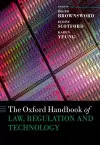
The Oxford Handbook of Law, Regulation and Technology
3 contributors - Hardback
£200.00
Roger Brownsword holds professorial positions at King's College London and Bournemouth University, and he is Honorary Professor in Law at Sheffield University. Until his retirement in 2010, he was founding Director of TELOS, an inter-disciplinary research centre at King's College London that focuses on law, ethics, and technology. He has acted as an adviser to parliamentary committees dealing with stem cells, cloning, and hybrid embryos, he was a member of the Nuffield Council on Bioethics from 2004 - 2010, he served on the Royal Society Brain Waves' Working Party on neuroscience and the law, and he was chair of the Ethics and Governance Council of UK Biobank from 2011-2015. He has published some 20 books and more than 200 academic papers; he is on the editorial board of the Modern Law Review, the International Journal of Law and Information Technology, and the Journal of Law and the Biosciences; and he is the founding general editor of Law, Innovation and Technology. Eloise Scotford is Senior Lecturer at The Dickson Poon School of Law at King's College London. She joined King's in 2010, after a previous appointment as Career Development Fellow in Environmental Law in the Faculty of Law and Corpus Christi College, University of Oxford. Dr Scotford actively researches in the areas of climate change law and governance, waste regulation, air quality control, comparative environmental law and sustainable development. Dr Scotford is Associate Member of Landmark Chambers, a visiting lecturer in environmental law at Bocconi University in Milan, and Analysis Editor for the Journal of Environmental Law. She also represents the United Kingdom in the Avosetta Group of EU environmental law experts. Karen Yeung is a Professor of Law at King's College London and a Distinguished Visiting Fellow at Melbourne Law School. From 1996 until 2006 she was a University Lecturer in Law at Oxford University Faculty of Law and a Tutorial Fellow in Law at St Anne's College, University of Oxford. She has established an international reputation in two fields: as an academic pioneer in helping to establish the intellectual coherence and value of regulation studies (or 'regulatory governance' studies) as a field of scholarly inquiry and as a leading scholar concerned with critically examining the governance of, and governance through, new and emerging technologies. Her current research focuses on critically evaluating the nature, legal, democratic and ethical implications of artificial intelligence, Big Data driven predictive decision-making and advances in neuroscientific techniques across a wide range of policy domains including commerce, healthcare, legal services and the enforcement of law.